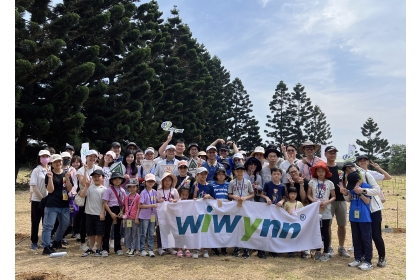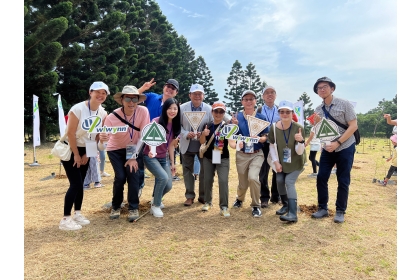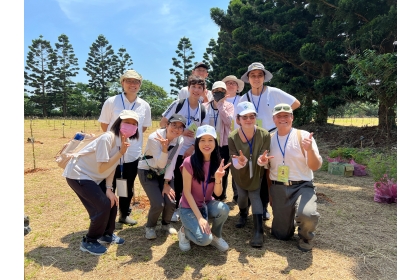NCHU and Wiwynn to Launch the First Experiment of Carbon Sink and Credit from Afforestation in the Taiwan Tech Industry
2024-05-21
興新聞張貼者
Unit秘書室
1,710
As enterprises increasingly prioritize global climate change mitigation efforts, National Chung Hsing University (NCHU) and Wiwynn announced the launch of a pioneering environmental initiative – the "Wiwynn Green Canopy," Taiwan’s first Carbon Rights Afforestation Program in the tech industry on May 18. This initiative, established through a strategic partnership with NCHU and actively supported by Wiwynn employees and their children, lays the foundation for carbon sinks and biodiversity conservation for future generations. Aimed at enhancing carbon sinks and securing carbon credits, the program is also planned to serve as an educational hub for environmental sustainability, contributing to the United Nations Sustainable Development Goals (SDGs): the 13th Goal of Climate Action, the 15th Goal of Life on Land, the 4th Goal of Quality Education, and the 11th Goal of Sustainable Cities and Communities.
Carbon sinks, functioning as “reservoirs,” play a critical role in reducing greenhouse gas concentrations and mitigating climate change by absorbing, storing, and fixing carbon compounds from the atmosphere, including carbon dioxide. They comprise forests, oceans, wetlands, and soils. Additionally, Taiwan’s Executive Yuan (行政院) National Development Council (國發會) identifies carbon sinks as key strategies in Taiwan's pathway to achieving net-zero emissions by 2050.
Since 2021, Wiwynn has been actively participating in global carbon reduction efforts through its "Ocean Hugs" program, engaging in afforestation initiatives in Taiwan and overseas sites, including the recent restoration of 10,000 fish-attracting trees and 8,000 corals in Hangwan (杭灣), Penghu (澎湖), Taiwan.
Through this industry-academic partnership with NCHU, Wiwynn has established the Wiwynn Green Canopy in Taoyuan (桃園), Taiwan, a 0.8-hectare leased land. Under the guidance of Prof. Wan-Yu Liu’s team from the NCHU Department of Forestry, nearly 800 trees will be planted. Prof. Liu is also instrumental in guiding Wiwynn through the adoption of the “Methodology of Afforestation” published by the Ministry of Environment (環境部), facilitating the calculation of forest carbon stocks and the application process for carbon credits, establishing the foundation for Wiwynn's future expansion of carbon rights applications.
NCHU and Wiwynn carefully selected planted trees such as the Taiwan Formosan Ash (光臘樹) and the Taiwan Golden-rain trees (台灣欒樹) for their robust carbon-sequestering capabilities and rich biodiversity potential. These trees not only provide conducive habitats for insects like rhinoceros beetles but also align perfectly with Wiwynn's vision of maximizing natural carbon capture. Additionally, Wiwynn plans to collaborate with the forthcoming Wiwynn Sustainability Foundation to establish the "Wiwynn Green Canopy" as a hub for environmental conservation and ecological education for nearby elementary schools and communities. Through the Wiwynn Green Canopy, the company aims to leverage the therapeutic benefits of nature to enhance individuals’ well-being.
Emily Hong, Chair and Chief Strategy Officer of Wiwynn, underscores the company's dedication to corporate, environmental, and social welfare, actively contributing to ecology and sustainable development. She emphasizes, “We believe that through tree planting, we can not only establish natural carbon sinks to reduce carbon emissions and combat climate change but also enhance ecological environments. We are thrilled to collaborate with the NCHU Department of Forestry to achieve natural carbon reduction, biodiversity preservation, and sustainable education. This program serves as a starting point and a precedent for carbon credit applications, and we aim to further expand its scope."
Prof. Jenn-Ming Song, Dean of Research & Development Department at NCHU highlighted, "Amidst the global trends of net-zero carbon reduction and corporate emphasis on ESG, NCHU and Wiwynn collaborate on the afforestation project in Taoyuan. Through land improvement and afforestation to increase plain forest carbon sinks, this collaboration will effectively reduce carbon emissions, mitigate temperature rise, combat pollution, and prevent wind damage, creating a triple-win situation for corporate social responsibility and environmental sustainability. We hope this project can become a model for plain forest carbon sinks across the nation."
Carbon sinks, functioning as “reservoirs,” play a critical role in reducing greenhouse gas concentrations and mitigating climate change by absorbing, storing, and fixing carbon compounds from the atmosphere, including carbon dioxide. They comprise forests, oceans, wetlands, and soils. Additionally, Taiwan’s Executive Yuan (行政院) National Development Council (國發會) identifies carbon sinks as key strategies in Taiwan's pathway to achieving net-zero emissions by 2050.
Since 2021, Wiwynn has been actively participating in global carbon reduction efforts through its "Ocean Hugs" program, engaging in afforestation initiatives in Taiwan and overseas sites, including the recent restoration of 10,000 fish-attracting trees and 8,000 corals in Hangwan (杭灣), Penghu (澎湖), Taiwan.
Through this industry-academic partnership with NCHU, Wiwynn has established the Wiwynn Green Canopy in Taoyuan (桃園), Taiwan, a 0.8-hectare leased land. Under the guidance of Prof. Wan-Yu Liu’s team from the NCHU Department of Forestry, nearly 800 trees will be planted. Prof. Liu is also instrumental in guiding Wiwynn through the adoption of the “Methodology of Afforestation” published by the Ministry of Environment (環境部), facilitating the calculation of forest carbon stocks and the application process for carbon credits, establishing the foundation for Wiwynn's future expansion of carbon rights applications.
NCHU and Wiwynn carefully selected planted trees such as the Taiwan Formosan Ash (光臘樹) and the Taiwan Golden-rain trees (台灣欒樹) for their robust carbon-sequestering capabilities and rich biodiversity potential. These trees not only provide conducive habitats for insects like rhinoceros beetles but also align perfectly with Wiwynn's vision of maximizing natural carbon capture. Additionally, Wiwynn plans to collaborate with the forthcoming Wiwynn Sustainability Foundation to establish the "Wiwynn Green Canopy" as a hub for environmental conservation and ecological education for nearby elementary schools and communities. Through the Wiwynn Green Canopy, the company aims to leverage the therapeutic benefits of nature to enhance individuals’ well-being.
Emily Hong, Chair and Chief Strategy Officer of Wiwynn, underscores the company's dedication to corporate, environmental, and social welfare, actively contributing to ecology and sustainable development. She emphasizes, “We believe that through tree planting, we can not only establish natural carbon sinks to reduce carbon emissions and combat climate change but also enhance ecological environments. We are thrilled to collaborate with the NCHU Department of Forestry to achieve natural carbon reduction, biodiversity preservation, and sustainable education. This program serves as a starting point and a precedent for carbon credit applications, and we aim to further expand its scope."
Prof. Jenn-Ming Song, Dean of Research & Development Department at NCHU highlighted, "Amidst the global trends of net-zero carbon reduction and corporate emphasis on ESG, NCHU and Wiwynn collaborate on the afforestation project in Taoyuan. Through land improvement and afforestation to increase plain forest carbon sinks, this collaboration will effectively reduce carbon emissions, mitigate temperature rise, combat pollution, and prevent wind damage, creating a triple-win situation for corporate social responsibility and environmental sustainability. We hope this project can become a model for plain forest carbon sinks across the nation."




